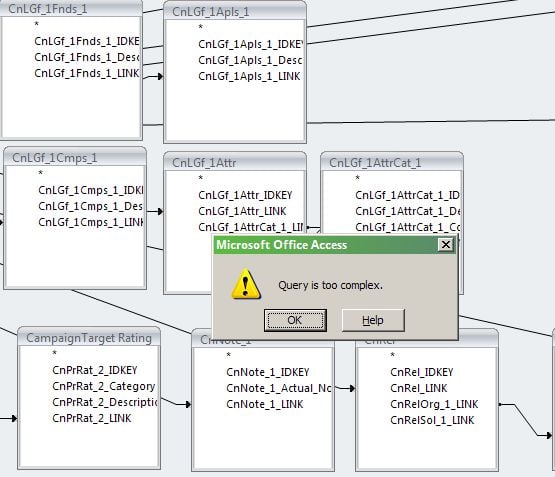Attributes
Options
Would the Attribute tab be a good place to track which constituents belong to various committees within the organization?
Tagged:
1
Comments
-
Donna Wolfgeher:
Would the Attribute tab be a good place to track which constituents belong to various committees within the organization?Donna -
We use attributes to track things like that
A Constituent Code would be another option, but I prefer an attribute for something like this
Joanne
4 -
Attributes work.
Depending on your need for the data, another option is a record for the committe and relationships to the individuals serving on the committee. It they are large committees and you want to show from/to dates the relationships work well. Gives a few more query options IMO. I wouldn't probably do for tons of small committees.
I've done this for our board after seeing it suggested on the forums.3 -
Short answer: Yes.
Long answer: Absolutely.
4 -
Donna Wolfgeher:
Would the Attribute tab be a good place to track which constituents belong to various committees within the organization?We use relationships -- create the committees as orgs and link the members to it. You can store more information this way, including positions, date from/to, information about the committee itself, etc.
3 -
If you have the Volunteer Module, that's another option for you.1
-
Donna Wolfgeher:
Would the Attribute tab be a good place to track which constituents belong to various committees within the organization?We currently use attributes to track this, all it advises is what committee they are a member of and the date they became a member (Date of attribute). However, we are now slowly looking to move this across into relationships where we will create the committee as an organisation and link individuals to it. We have found we need more information , such as their level of membership, full dates, important attributes relating to that specific relationship etc...It is much easier to store and query on in relationships. Unfortunately we have years and years worth of data to move across... So i would say it depends on what you think your needs will be with the data, if you literally just need numbers on how many people belong to a committee then attributes work fine, but if you need to dig deeper then it may be worth considering relationships now to save you the hassle of moving data across in the future.
0 -
Thanks—others are using relationships as well.
We might consider that.Donna
WolfgeherExecutive
AssistantCatholic
Education Foundation (CEF)12615 Parallel
Pkwy
Kansas City, KS 66109913-647-0344
0 -
I would also suggest looking at Constituent Codes. At my last organization, we recorded members of the Alumni Council, the Board of Trustees, and the Foundation Board this way. We used the to and from dates, but when they left the board or council, we would change the Constituent Code to "Former Alumni Councilor" or whatever was appropriate. We did this becuase we pulled lots of other things based soley on their membership in one of these boards, especially mailing lists. It was easy to include or exclude based on Constituent Code, where it wouldn't be as easy to do so from Relationships.
That said, if you have a Constituent Code that is the primary connection with the person, and they are rotating members of several committees, I would probably go with a combination of Attributes with Notes. I just found Relationships so cumbersome it was really annoying when it came to queries. If I were using Relationships, I don't think I'd create each committee as a separate organization - that seems like too many non-constituent records to keep organized but I guess it depends on how important these committees are to your operations and reporting. In Attributes, I'd use the date as an "expiration" date to grab all who were still on the committee (greater than today), or leave the date blank for current members and put the end date in (Attribute date = blank). The comments could be used for whichever date you didn't use in the date field, and/or their office (if any) in the committee (President). I'd then make a Notes category of "Committee Activity" so you could easily pull all notes on just that, and make the description of the first and last one just "Joined Committee (Treasurer) 01/01/18" and "Left committee 12/31/18" or similar. That's easy to read quickly in the Notes page.
Gracie Schild
Bluebird Business Services
Santa Fe NM0 -
Thanks, Gracie. I agree with you about the relationships in queries. very cumbersome. We have 12 committees and the biggest has 16 members. We don't care about the to and from part.I find them very easy to query putting them in attibutes. When it comes time to add or take off we'll just delete that attribute as we don't need that history. Thanks for taking the time to answer!0
Categories
- All Categories
- Shannon parent
- shannon 2
- shannon 1
- 21 Advocacy DC Users Group
- 14 BBCRM PAG Discussions
- 89 High Education Program Advisory Group (HE PAG)
- 28 Luminate CRM DC Users Group
- 8 DC Luminate CRM Users Group
- Luminate PAG
- 5.9K Blackbaud Altru®
- 58 Blackbaud Award Management™ and Blackbaud Stewardship Management™
- 409 bbcon®
- 2.1K Blackbaud CRM™ and Blackbaud Internet Solutions™
- donorCentrics®
- 1.1K Blackbaud eTapestry®
- 2.8K Blackbaud Financial Edge NXT®
- 1.1K Blackbaud Grantmaking™
- 527 Education Management Solutions for Higher Education
- 1 JustGiving® from Blackbaud®
- 4.6K Education Management Solutions for K-12 Schools
- Blackbaud Luminate Online & Blackbaud TeamRaiser
- 16.4K Blackbaud Raiser's Edge NXT®
- 4.1K SKY Developer
- 547 ResearchPoint™
- 151 Blackbaud Tuition Management™
- 61 everydayhero
- 3 Campaign Ideas
- 58 General Discussion
- 115 Blackbaud ID
- 87 K-12 Blackbaud ID
- 6 Admin Console
- 949 Organizational Best Practices
- 353 The Tap (Just for Fun)
- 235 Blackbaud Community Feedback Forum
- 55 Admissions Event Management EAP
- 18 MobilePay Terminal + BBID Canada EAP
- 36 EAP for New Email Campaigns Experience in Blackbaud Luminate Online®
- 109 EAP for 360 Student Profile in Blackbaud Student Information System
- 41 EAP for Assessment Builder in Blackbaud Learning Management System™
- 9 Technical Preview for SKY API for Blackbaud CRM™ and Blackbaud Altru®
- 55 Community Advisory Group
- 46 Blackbaud Community Ideas
- 26 Blackbaud Community Challenges
- 7 Security Testing Forum
- 3 Blackbaud Staff Discussions
- 1 Blackbaud Partners Discussions
- 1 Blackbaud Giving Search™
- 35 EAP Student Assignment Details and Assignment Center
- 39 EAP Core - Roles and Tasks
- 59 Blackbaud Community All-Stars Discussions
- 20 Blackbaud Raiser's Edge NXT® Online Giving EAP
- Diocesan Blackbaud Raiser’s Edge NXT® User’s Group
- 2 Blackbaud Consultant’s Community
- 43 End of Term Grade Entry EAP
- 92 EAP for Query in Blackbaud Raiser's Edge NXT®
- 38 Standard Reports for Blackbaud Raiser's Edge NXT® EAP
- 12 Payments Assistant for Blackbaud Financial Edge NXT® EAP
- 6 Ask an All Star (Austen Brown)
- 8 Ask an All-Star Alex Wong (Blackbaud Raiser's Edge NXT®)
- 1 Ask an All-Star Alex Wong (Blackbaud Financial Edge NXT®)
- 6 Ask an All-Star (Christine Robertson)
- 21 Ask an Expert (Anthony Gallo)
- Blackbaud Francophone Group
- 22 Ask an Expert (David Springer)
- 4 Raiser's Edge NXT PowerUp Challenge #1 (Query)
- 6 Ask an All-Star Sunshine Reinken Watson and Carlene Johnson
- 4 Raiser's Edge NXT PowerUp Challenge: Events
- 14 Ask an All-Star (Elizabeth Johnson)
- 7 Ask an Expert (Stephen Churchill)
- 2025 ARCHIVED FORUM POSTS
- 322 ARCHIVED | Financial Edge® Tips and Tricks
- 164 ARCHIVED | Raiser's Edge® Blog
- 300 ARCHIVED | Raiser's Edge® Blog
- 441 ARCHIVED | Blackbaud Altru® Tips and Tricks
- 66 ARCHIVED | Blackbaud NetCommunity™ Blog
- 211 ARCHIVED | Blackbaud Target Analytics® Tips and Tricks
- 47 Blackbaud CRM Higher Ed Product Advisory Group (HE PAG)
- Luminate CRM DC Users Group
- 225 ARCHIVED | Blackbaud eTapestry® Tips and Tricks
- 1 Blackbaud eTapestry® Know How Blog
- 19 Blackbaud CRM Product Advisory Group (BBCRM PAG)
- 1 Blackbaud K-12 Education Solutions™ Blog
- 280 ARCHIVED | Mixed Community Announcements
- 3 ARCHIVED | Blackbaud Corporations™ & Blackbaud Foundations™ Hosting Status
- 1 npEngage
- 24 ARCHIVED | K-12 Announcements
- 15 ARCHIVED | FIMS Host*Net Hosting Status
- 23 ARCHIVED | Blackbaud Outcomes & Online Applications (IGAM) Hosting Status
- 22 ARCHIVED | Blackbaud DonorCentral Hosting Status
- 14 ARCHIVED | Blackbaud Grantmaking™ UK Hosting Status
- 117 ARCHIVED | Blackbaud CRM™ and Blackbaud Internet Solutions™ Announcements
- 50 Blackbaud NetCommunity™ Blog
- 169 ARCHIVED | Blackbaud Grantmaking™ Tips and Tricks
- Advocacy DC Users Group
- 718 Community News
- Blackbaud Altru® Hosting Status
- 104 ARCHIVED | Member Spotlight
- 145 ARCHIVED | Hosting Blog
- 149 JustGiving® from Blackbaud® Blog
- 97 ARCHIVED | bbcon® Blogs
- 19 ARCHIVED | Blackbaud Luminate CRM™ Announcements
- 161 Luminate Advocacy News
- 187 Organizational Best Practices Blog
- 67 everydayhero Blog
- 52 Blackbaud SKY® Reporting Announcements
- 17 ARCHIVED | Blackbaud SKY® Reporting for K-12 Announcements
- 3 Luminate Online Product Advisory Group (LO PAG)
- 81 ARCHIVED | JustGiving® from Blackbaud® Tips and Tricks
- 1 ARCHIVED | K-12 Conference Blog
- Blackbaud Church Management™ Announcements
- ARCHIVED | Blackbaud Award Management™ and Blackbaud Stewardship Management™ Announcements
- 1 Blackbaud Peer-to-Peer Fundraising™, Powered by JustGiving® Blogs
- 39 Tips, Tricks, and Timesavers!
- 56 Blackbaud Church Management™ Resources
- 154 Blackbaud Church Management™ Announcements
- 1 ARCHIVED | Blackbaud Church Management™ Tips and Tricks
- 11 ARCHIVED | Blackbaud Higher Education Solutions™ Announcements
- 7 ARCHIVED | Blackbaud Guided Fundraising™ Blog
- 2 Blackbaud Fundraiser Performance Management™ Blog
- 9 Foundations Events and Content
- 14 ARCHIVED | Blog Posts
- 2 ARCHIVED | Blackbaud FIMS™ Announcement and Tips
- 59 Blackbaud Partner Announcements
- 10 ARCHIVED | Blackbaud Impact Edge™ EAP Blogs
- 1 Community Help Blogs
- Diocesan Blackbaud Raiser’s Edge NXT® Users' Group
- Blackbaud Consultant’s Community
- Blackbaud Francophone Group
- 1 BLOG ARCHIVE CATEGORY
- Blackbaud Community™ Discussions
- 8.3K Blackbaud Luminate Online® & Blackbaud TeamRaiser® Discussions
- 5.7K Jobs Board



 Community All-Star
Community All-Star



